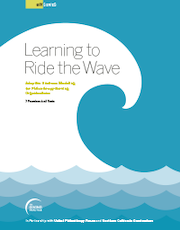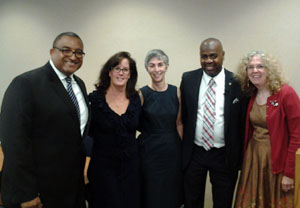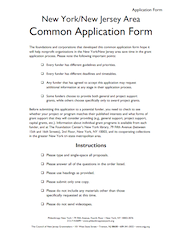Site Search
- resource provided by the Forum Network Knowledgebase.
Search Tip: Search with " " to find exact matches.
Tax Exempt Organization Search helps users find information about a tax-exempt organization’s federal tax status and filings. You can find:
- Organizations eligible to receive tax-deductible charitable contributions (Pub 78 data).
- Automatically revoked organizations
- IRS determination letters dated on or after January 1, 2014
- Form 990-series returns
- Organizations that have filed a Form 990-N (e-Postcard)
This case study of the Council of Michigan Foundations' Peer Action Learning Network (PALN) is one of six examined in a report from New York University's Wagner Research Center for Leadership in Action, commissioned by Grantmakers for Effective Organizations. The PALN case study, along with the other five, explores the power of learning communities to build connections and knowledge to increase organizations’ community impact. It explains ways grantmakers can strategically support these efforts as well as key elements for designing learning communities, executing for success and extending the learning.

Developed in partnership with United Philanthropy Forum and Northern California Grantmakers, this guide shares seven practices and 12 tools for Philanthropy-Serving Organizations who seek effective ways to mobilize resources to sustain their organization’s work. The guide features perspectives from dozens of leaders of national and regional PSOs and examples from our work with these organizations. Much of the content is based on conversations and strategy work with PSO leaders, staff and board members.
At a recent Ocean & Monmouth Funders Roundtable, the group discussed all of the different databases and lists of nonprofits available to philanthropy to be able to research new and different nonprofits.


More than a decade ago, the Council of New Jersey Grantmakers and Philanthropy New York spearheaded a project to develop common application and report forms to help streamline the grant application process and ease the often time-consuming grant preparation process.
This application is a four-page form, which includes directions for use, a sample cover sheet, and the common grant proposal guidelines.
The separate Common Report Form follows closely the format of the New York/New Jersey Area Common Application Form.
Information for Grantmakers:
One of the core values at the Trust-Based Philanthropy Project (with whom CNJG partnered on a trust-based grantmaking learning series in the summer of 2021 – read about Part 1, Part 2, and Part 3) encourages funders to streamline their requirements for paperwork from nonprofits. Accepting the NY/NJ Area Common Grant Report Form is one way. Another is to accept reports from nonprofits that they submitted to a different funder.
Recent articles from Vu Le at NonprofitAF.com (We need to have a serious talk about character limits on grant applications and Trust-based grantmaking: What it is and why it’s critical to our sector), Joan Garry in the Chronicle of Philanthropy (A Plea from Community Nonprofits for Investment Equity and less Bureaucracy), and the research project by the Technology Association of Grantmakers (Grant Applications Share 39% Similarity According to New Research by TAG) in the summer of 2021 have re-focused attention on the concept of a common grant application.
CNJG encourages our members to review the application and report form, and consider accepting these forms (or using these questions on your online application / report form) from your current or potential grantees.
CNJG surveyed our members in August 2021 asking if they accepted the NY/NJ Area Common Grant Application and report form. CNJG members can download that report (link forthcoming).
Information for Grantseekers:
Before sending this (or any) application to any funder, be sure to check their specific funding guidelines and application requirements. Some funders require preliminary, additional, or supplementary information. Some funders only accept their own application form. CNJG members are under no obligation to accept either the common grant application or common grant report form.
Additional notes when using the NY/NJ Area Common Grant Application Form:
- Please check with each individual funder if they accept only their own form, the NY/NJ Area Common Grant Application form, or some other form.
- Funding area guidelines still apply. Research each organization’s funding areas to be sure your proposal fits within their guidelines before submitting your application.
- Any funder that has agreed to accept the NY/NJ Area Common Grant Application may request additional information at any stage in their application process.
- Every funder has different deadlines and timetables. Refer to each organization's funding and/or reporting guidelines.
- Do not submit the NY/NJ Area Common Grant Application or report form to the Council of New Jersey Grantmakers. Submit your application directly to the organization from which you are requesting support.
- Questions should be directed to the organization from which you are requesting support.
